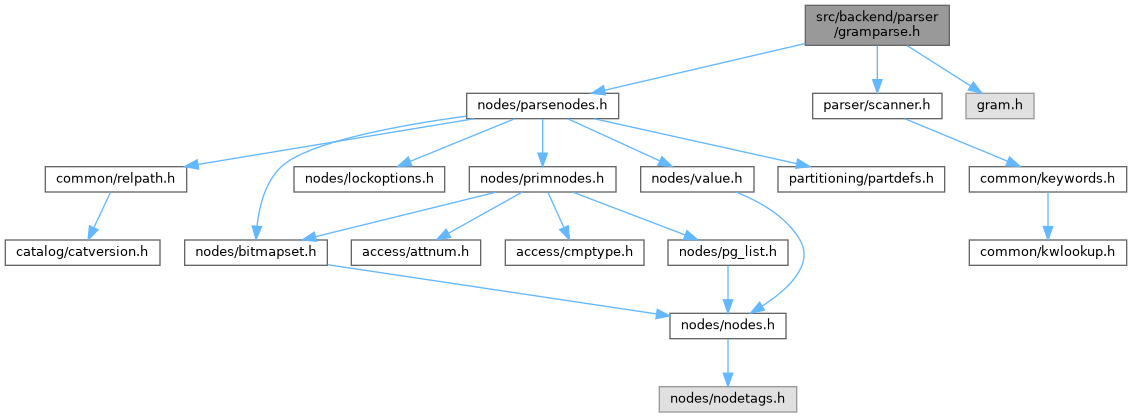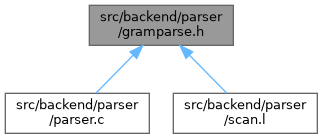Loading...
Searching...
No Matches
gramparse.h File Reference
Include dependency graph for gramparse.h:

This graph shows which files directly or indirectly include this file:

Go to the source code of this file.
Data Structures | |
| struct | base_yy_extra_type |
Macros | |
| #define | pg_yyget_extra(yyscanner) (*((base_yy_extra_type **) (yyscanner))) |
Typedefs | |
| typedef struct base_yy_extra_type | base_yy_extra_type |
Functions | |
| int | base_yylex (YYSTYPE *lvalp, YYLTYPE *llocp, core_yyscan_t yyscanner) |
| void | parser_init (base_yy_extra_type *yyext) |
| int | base_yyparse (core_yyscan_t yyscanner) |
Macro Definition Documentation
◆ pg_yyget_extra
| #define pg_yyget_extra | ( | yyscanner | ) | (*((base_yy_extra_type **) (yyscanner))) |
Definition at line 64 of file gramparse.h.
Typedef Documentation
◆ base_yy_extra_type
Function Documentation
◆ base_yylex()
|
extern |
Definition at line 111 of file parser.c.
112{
118
119 /* Get next token --- we might already have it */
121 {
128 }
129 else
131
132 /*
133 * If this token isn't one that requires lookahead, just return it. If it
134 * does, determine the token length. (We could get that via strlen(), but
135 * since we have such a small set of possibilities, hardwiring seems
136 * feasible and more efficient --- at least for the fixed-length cases.)
137 */
139 {
141 cur_token_length = 6;
142 break;
144 cur_token_length = 3;
145 break;
147 cur_token_length = 5;
148 break;
150 cur_token_length = 4;
151 break;
155 break;
157 cur_token_length = 7;
158 break;
159 default:
161 }
162
163 /*
164 * Identify end+1 of current token. core_yylex() has temporarily stored a
165 * '\0' here, and will undo that when we call it again. We need to redo
166 * it to fully revert the lookahead call for error reporting purposes.
167 */
171
172 /*
173 * Save and restore *llocp around the call. It might look like we could
174 * avoid this by just passing &lookahead_yylloc to core_yylex(), but that
175 * does not work because flex actually holds onto the last-passed pointer
176 * internally, and will use that for error reporting. We need any error
177 * reports to point to the current token, not the next one.
178 */
180
181 /* Get next token, saving outputs into lookahead variables */
185
187
188 /* Now revert the un-truncation of the current token */
191
193
194 /* Replace cur_token if needed, based on lookahead */
196 {
198 /* Replace FORMAT by FORMAT_LA if it's followed by JSON */
200 {
203 break;
204 }
205 break;
206
208 /* Replace NOT by NOT_LA if it's followed by BETWEEN, IN, etc */
210 {
217 break;
218 }
219 break;
220
222 /* Replace NULLS_P by NULLS_LA if it's followed by FIRST or LAST */
224 {
228 break;
229 }
230 break;
231
233 /* Replace WITH by WITH_LA if it's followed by TIME or ORDINALITY */
235 {
239 break;
240 }
241 break;
242
244 /* Replace WITHOUT by WITHOUT_LA if it's followed by TIME */
246 {
249 break;
250 }
251 break;
252
255 /* Look ahead for UESCAPE */
257 {
258 /* Yup, so get third token, which had better be SCONST */
260
261 /* Again save and restore *llocp */
263
264 /* Un-truncate current token so errors point to third token */
266
267 /* Get third token */
269 llocp, yyscanner);
270
271 /* If we throw error here, it will point to third token */
274 yyscanner);
275
279 yyscanner);
280
281 /* Now restore *llocp; errors will point to first token */
283
284 /* Apply Unicode conversion */
285 lvalp->core_yystype.str =
287 escstr[0],
288 *llocp,
289 yyscanner);
290
291 /*
292 * We don't need to revert the un-truncation of UESCAPE. What
293 * we do want to do is clear have_lookahead, thereby consuming
294 * all three tokens.
295 */
297 }
298 else
299 {
300 /* No UESCAPE, so convert using default escape character */
301 lvalp->core_yystype.str =
303 '\\',
304 *llocp,
305 yyscanner);
306 }
307
309 {
310 /* It's an identifier, so truncate as appropriate */
313 true);
315 }
317 {
319 }
320 break;
321 }
322
324}
static char * str_udeescape(const char *str, char escape, int position, core_yyscan_t yyscanner)
Definition parser.c:372
static bool next_token(char **lineptr, StringInfo buf, bool *initial_quote, bool *terminating_comma)
Definition hba.c:184
void scanner_yyerror(const char *message, core_yyscan_t yyscanner)
Definition scan.l:1197
int core_yylex(core_YYSTYPE *yylval_param, YYLTYPE *yylloc_param, core_yyscan_t yyscanner)
Definition gramparse.h:36
References Assert, check_uescapechar(), core_yylex(), fb(), next_token(), pg_yyget_extra, scanner_yyerror(), str_udeescape(), truncate_identifier(), and yyextra.
◆ base_yyparse()
|
extern |
◆ parser_init()
|
extern |